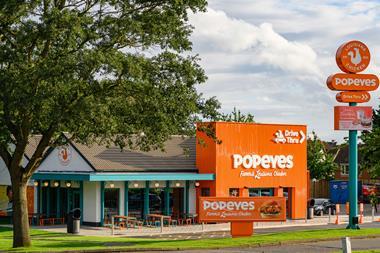>>the industry is being a good sport over health - Melanie Leech, director general, Food and Drink Federation
During the next few weeks and months we will begin to get a glimpse of the way government and its agencies see the future nutritional landscape.
We have a busy time ahead: FSA’s consultation on its nutritional profile model has just ended - it is intended to give advice to Ofcom on a possible mechanism for restricting certain food and drink advertising to children.
Ofcom itself will begin consulting on how to tighten up the regime on advertising to children; the reform of the school meals regime - announced at this week’s Labour Party conference - will start to roll forward; and we should also see FSA’s preferred option on signposting. Will it be the controversial traffic lights or will consumers have a preference for more informative information on pack?
We also expect the second phase of the FSA salt awareness campaign, and further development of targets for salt reduction.
Where are manufacturers in all this?
This time last year the food industry published its Food and Health Manifesto, setting out commitments on a range of issues key to the food and health debate.
Last week we published our Delivering On Our Commitments report, and the findings illustrate clearly how FDF’s main member companies had delivered against the manifesto commitments.
We surveyed 20 household name companies accounting for some £35bn worth of sales at retail value.
The survey revealed very encouraging figures showing huge movement on product reformulation, on vending and on better nutritional information. For example two thirds of respondents’ products will feature GDAs and salt equivalence information.
A crucial commitment in the manifesto was to address the knotty issue of advertising to kids. The industry has, working with the advertising sector, made substantive proposals to Ofcom setting out ideas for tightening mandatory codes of practice.
We have proposed the creation of a new section of the broadcasting code that would specifically cover advertising to children with tighter provisions on diet and lifestyle; promotional offers; the use of characters and celebrities; and accuracy in advertising covering health and nutritional benefits.
This is not a one-off effort. Our report is a snapshot of a continuing engagement by
industry which goes back some years, and will continue for the foreseeable future.
As an industry - reflected in individual companies’ actions - we are firmly committed to playing our part.
However, we must all recognise that we will only see meaningful change when, as individuals, we become more aware of the need for balance in lifestyle and act on this.
As well as eating sensibly, we will need to become more active. This can be as simple as walking to the shops or getting off the bus a stop early, or a host of other small but meaningful actions to increase our physical activity. The FDF Foodfitness programme - available in every school in the country - sets out just these type of tips.
We believe the government’s plans for a public information programme on diet and lifestyle is also fundamental to success. The industry is fully committed to creating a working partnership with the government on this type of project.
We are in discussion with government about how we can play our part but our proposals here involve not just providing money and resource. We could for example use our packs as a means of delivering government health messages creating millions of opportunities every day to remind consumers of the importance of a balanced diet and an active lifestyle.
Government can reinforce this with the huge range of communications channels available to it via health professionals and educators. The result could provide a real chance of bringing about substantial behaviour change in diet and exercise.
During the next few weeks and months we will begin to get a glimpse of the way government and its agencies see the future nutritional landscape.
We have a busy time ahead: FSA’s consultation on its nutritional profile model has just ended - it is intended to give advice to Ofcom on a possible mechanism for restricting certain food and drink advertising to children.
Ofcom itself will begin consulting on how to tighten up the regime on advertising to children; the reform of the school meals regime - announced at this week’s Labour Party conference - will start to roll forward; and we should also see FSA’s preferred option on signposting. Will it be the controversial traffic lights or will consumers have a preference for more informative information on pack?
We also expect the second phase of the FSA salt awareness campaign, and further development of targets for salt reduction.
Where are manufacturers in all this?
This time last year the food industry published its Food and Health Manifesto, setting out commitments on a range of issues key to the food and health debate.
Last week we published our Delivering On Our Commitments report, and the findings illustrate clearly how FDF’s main member companies had delivered against the manifesto commitments.
We surveyed 20 household name companies accounting for some £35bn worth of sales at retail value.
The survey revealed very encouraging figures showing huge movement on product reformulation, on vending and on better nutritional information. For example two thirds of respondents’ products will feature GDAs and salt equivalence information.
A crucial commitment in the manifesto was to address the knotty issue of advertising to kids. The industry has, working with the advertising sector, made substantive proposals to Ofcom setting out ideas for tightening mandatory codes of practice.
We have proposed the creation of a new section of the broadcasting code that would specifically cover advertising to children with tighter provisions on diet and lifestyle; promotional offers; the use of characters and celebrities; and accuracy in advertising covering health and nutritional benefits.
This is not a one-off effort. Our report is a snapshot of a continuing engagement by
industry which goes back some years, and will continue for the foreseeable future.
As an industry - reflected in individual companies’ actions - we are firmly committed to playing our part.
However, we must all recognise that we will only see meaningful change when, as individuals, we become more aware of the need for balance in lifestyle and act on this.
As well as eating sensibly, we will need to become more active. This can be as simple as walking to the shops or getting off the bus a stop early, or a host of other small but meaningful actions to increase our physical activity. The FDF Foodfitness programme - available in every school in the country - sets out just these type of tips.
We believe the government’s plans for a public information programme on diet and lifestyle is also fundamental to success. The industry is fully committed to creating a working partnership with the government on this type of project.
We are in discussion with government about how we can play our part but our proposals here involve not just providing money and resource. We could for example use our packs as a means of delivering government health messages creating millions of opportunities every day to remind consumers of the importance of a balanced diet and an active lifestyle.
Government can reinforce this with the huge range of communications channels available to it via health professionals and educators. The result could provide a real chance of bringing about substantial behaviour change in diet and exercise.














No comments yet